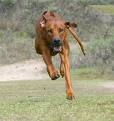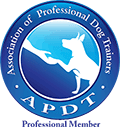Archived ABA :: The Rhodesian Ridgeback
by Michael Santoro
| Have you ever been at the dog run and wondered about the big dog that ran tirelessly around the enclosure, taunting the other dogs with its blazing speed, but definitely not a Greyhound? Well, chances are, you were watching a Rhodesian Ridgeback. |
 |
The Rhodesian Ridgeback originated in Rhodesia (currently the countries of Zambia and Zimbabwe), named for the 19th century English industrialist and imperialist, Cecil Rhodes. The breed was the result of early crossbreeding of the colonists' dogs to the ridged hunting dogs of the local Khoisan people. Though its origins are disputed, Cornelius Van Rooyen is credited with the early development of the breed, having crossed two of the local ridged females to some of his own dogs to produce some ridged offspring that were very effective at lion hunting. European game hunters were looking for a fast, hearty dog that could circle and face down the big cats, keeping them at bay while the hunters took aim. The dogs also had to be resistant to disease as well as smart enough to avoid crocodiles and snakes. Usually packs as large as twenty were used on the lion hunts to ensure a successful kill for the hunters. But, since a missed shot often proved fatal for at least one pack member, this method of lion hunting didn't last long.
Depending on size and gender, a Ridgeback will stand between 24 to 27 inches high and weigh somewhere between 70 and 85 pounds. A member of the hound group, he is a decidedly active, athletic dog, with a clean, well-muscled physique. Overall, he has a symmetrical, balanced appearance. There is little variation in color with this short-coated breed, ranging from light wheaten to red wheaten, sometimes with a small patch of white on the chest and toes. The defining characteristic, of course, is the narrow ridge of hair along the spine that grows in the opposite direction from the rest of the coat. Only occasional grooming is necessary, about once a week, making them very easy to care for.
The Ridgeback has an even and dignified temperament. He is a quiet dog who rarely barks. Devoted and affectionate to his master, he tends to be reserved with strangers. His loyal and gentle nature makes him a good candidate for homes with children. A Rhodesian Ridgeback is also a good home protector: one minute, he can be resting quietly in the shade; the next, instantly focused and alert at the appearance of a stranger. His confident, straightforward posture can make for an imposing presence.
With a strong innate prey drive, it may prove unwise for a Ridgeback to live with other small pets. While he does enjoy a lazy afternoon lying in the living room, the Ridgeback is naturally a running and hunting dog who needs a good blow-out at least twice a week. A home with a large outdoor enclosure (once their prey drive takes over, they will run as far and as fast as possible to reach their goal) would suit this dog best. Depriving a Ridgeback of this necessity could well cause him to channel his unused energy into unwanted and possibly destructive behaviors in the home.
Proper socialization and at least basic obedience training is a must with this intelligent, active dog. A Ridgeback requires benevolent, patient and consistent training for life. With an understanding family group to give it plenty of activity and a structured home life, a Rhodesian Ridgeback will thrive as a loyal and loving companion.




